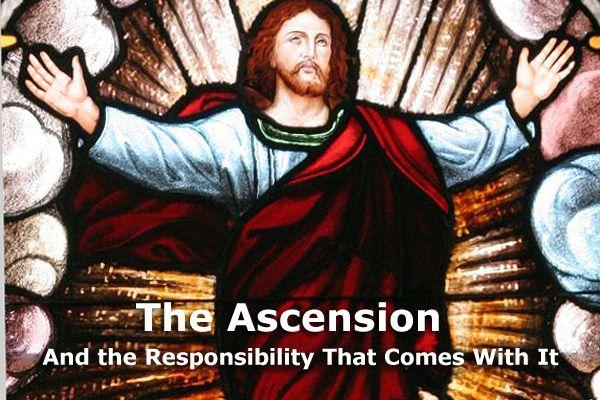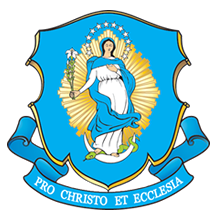
When I think of the Ascension of Christ into heaven - an event whose solemnity we celebrated May 1 - I cannot help but to think of the responsibility that often comes when loved ones leave.
I had a loved one leave once. I was in second grade. One day, out of the blue, my mother sat my brothers, sister and me down on the couch and told us in a calm voice that she'd be leaving for a few weeks. That wasn't the sort of thing my mother did. She was always there. She was our rock, our North Star. We guided our lives by her. I was a mamma's boy, and I'm not ashamed to admit it. So, of course, I was stunned.
Turns out she was being admitted into the hospital. She was feeling "a little sick," she explained. (I learned years later that she had been hospitalized due to an emotional breakdown.) At the time, all I knew was that she was leaving and that I wouldn't be seeing her for some time.
On departing, I recall she wasn't overly emotional. She just told us the facts as they were: That she loved us, which I knew to be true, and that we were expected to be good, to do our chores, to eat our meals, and to say our prayers. She told us she would come back - that nothing would keep her from coming back. And, lastly, she told us we were special. I didn't know what being "special" entailed, but it sounded like a good thing.
All in all, she entrusted us with a heavy responsibility - the heaviest responsibility I had ever been given up to that point - of living life without her with us, in the flesh.
I do wonder if the disciples felt similarly when Christ gathered them in Galilee before His Ascension. He had been with the disciples now for 40 days following His Resurrection. He had spent the time instructing and encouraging them. Now it was time for Him to ascend and take His place at the right hand of the Father.
Like my mom did with me, He left only after making a few things perfectly clear to his disciples and we who follow them. Namely:
We are loved and cared for by Him;
We are to be "good," that is to follow His teachings; and
He would return again, in the flesh, but that in the meantime, He would be with us "always, until the end of the age" (Mt 28:20).
Then, in the moments before His Ascension, He said, "Go into the world and proclaim the gospel to every creature" (Mk 16:15).
Those are marching orders. Indeed, with Christ's Ascension comes the end of a sort of spiritual boot camp. It marks the coming of age for those who call themselves His followers. The moment of truth has arrived.
Of course, the responsibility to which Christ entrusted the disciples then are the responsibilities He entrusts to us today. Nothing has changed. We are called to lives of holiness. We are called to trust in Him, to receive His mercy, and to be witnesses of His love and mercy to others.
The question is, will we do it? Will we live up to His expectations of us? Or will it be a matter of "out of sight, out of mind"?
Again, I think of those several weeks when my mom was away. I know that during that time I felt duty-bound not to disappoint her. I felt that way because I loved her. As Christians, we will only feel duty-bound to not disappoint our Merciful Lord when we truly learn to love Him.
Saint Faustina, the great apostostle of Divine Mercy, made an astounding entry in her Diary on May 26, 1938, on the Feast of the Ascension, an entry that echoes the gospel accounts of the Ascension:
Today I accompanied the Lord Jesus as He ascended into heaven. It was about noon. I was overcome by a great longing for God. It is a strange thing, the more I felt God's presence, the more ardently I desired Him. Then I saw myself in the midst of a huge crowd of disciples and apostles, together with the Mother of God. Jesus was telling them to ... Go out into the whole world and teach in My name. He stretched out His hands and blessed them and disappeared in a cloud.
Let's repeat one phrase in that entry: "The more I felt God's presence, the more ardently I desired Him." To me, that explains why it has so often been said that love is "the answer." Love is the answer. That's not just some cliché wrung of all meaning by a million terrible pop songs. Love makes doing good deeds come second nature. Love makes a life of holiness possible.
And when it's true love, you cannot help but to bear witness to it.
How do we learn to love Christ as St. Faustina did? Simple: Be a "mamma's" boy (or a mamma's girl). That is to say, turn to the Blessed Virgin Mary.
Why? It's important to note that after the Ascension, the apostles and disciples didn't panic or crumble by the weight of responsibility. In obedience to the Lord, they gathered in the upper room and devoted themselves to constant prayer, together with Mary, the Mother of Jesus (see Acts 1:4-5). As the Catechism tells us, "After her Son's Ascension, Mary 'aided the beginnings of the Church by her prayers.'" (965)
In other words, Mary knows what to do. And she's there to teach us. Back to that Diary entry: St. Faustina goes on to write how, following the Ascension, she "saw the longing of Our Lady." She writes, "Her soul yearned for Jesus with the whole force of Her love. But she was so peaceful and so united to the will of God that there was not a stir in Her heart but for what God wanted."
That's love!
Saint Faustina continues in entry 1711 to share Our Lady's instructions - simple, declarative instructions on how to please the Lord.
"When I was left alone with the Blessed Virgin, she instructed me concerning the interior life," she writes. "She said, The soul's true greatness is in loving God and in humbling oneself in His presence, completely forgetting oneself and believing oneself to be nothing; because the Lord is great, but He is well pleased only with the humble; He always opposes the proud."
That is to say, we are to be like children - God's children - with a heavy responsibility that is lightened through love. All of us: special children.
















